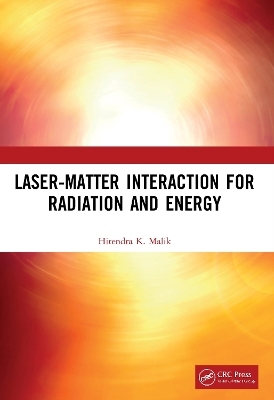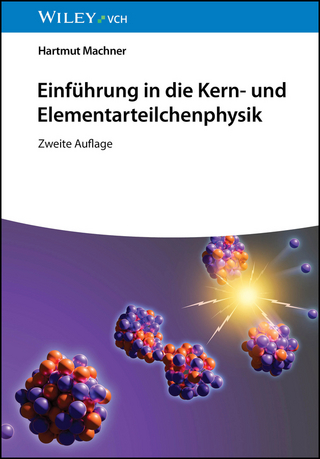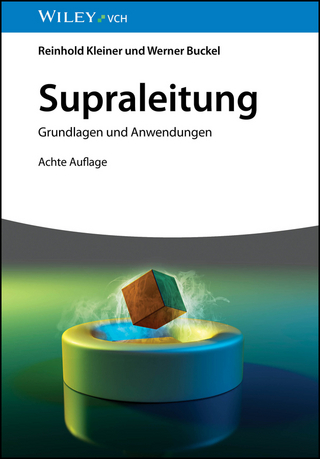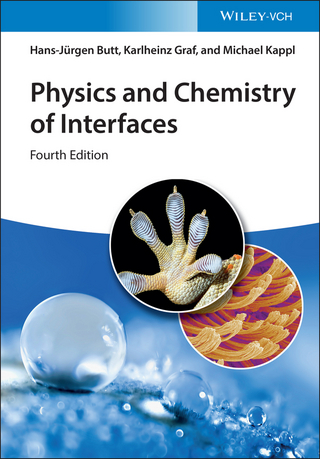
Laser-Matter Interaction for Radiation and Energy
CRC Press (Verlag)
978-0-367-65107-7 (ISBN)
The interaction of high-power lasers with matter can generate Terahertz radiations that efficiently contribute to THz Time-Domain Spectroscopy and also would replace X-rays in medical and security applications. When a short intense laser pulse ionizes a gas, it may produce new frequencies even in VUV to XUV domain. The duration of XUV pulses can be confined down to the isolated attosecond pulse levels, required to study the electronic re-arrangement and ultrafast processes. Another important aspect of laser-matter interaction is the laser thermonuclear fusion control where accelerated particles also find an efficient use.
This book provides comprehensive coverage of the most essential topics, including
Electromagnetic waves and lasers
THz radiation using semiconducting materials / nanostructures / gases / plasmas
Surface plasmon resonance
THz radiation detection
Particle acceleration technologies
X-ray lasers
High harmonics and attosecond lasers
Laser based techniques of thermonuclear fusion
Controlled fusion devices including NIF and ITER
The book comprises of 11 chapters and every chapter starts with a lucid introduction to the main topic. Then sub-topics are sedulously discussed keeping in mind their basics, methodology, state-of-the-art and future perspective that will prove to be salutary for readers. High quality solved examples are appended to the chapters for their deep understanding and relevant applications. In view of the nature of the topics and their level of discussion, this book is expected to have pre-eminent potential for researchers along with postgraduate and undergraduate students all over the world.
Hitendra K. Malik is currently a professor of physics at the Indian Institute of Technology (IIT) Delhi, from where he earned a PhD degree in the field of plasma physics in 1995. He has been a merit scholarship holder throughout his academic career. Owing to his worldwide recognition, his name was included in Marquis Who’s Who in 2011. Based on the survey conducted by ResearchGate in 2016, his scientific score was found within the top 5% of scientists and researchers all over the world. Professor Malik is highly cited in India and abroad for his research work and books with an h-index of 33 and an i10-index of 98. He has accomplished 14 sponsored research projects by arranging funds from various agencies such as Department of Science and Technology (DST), Council of Scientific and Industrial Research (CSIR), Defense Research and Development Organization (DRDO), All India Council for Technical Education (AICTE), Deutscher Akademischer Austausch Dienst (DAAD), Indo-French Centre for the Promotion of Advanced Research (IFCPAR / CEFIPRA), and so forth from the governments of India, Germany, and France. He has been on the editorial board of six reputed research journals and is recently working with two journals from Springer and Taylor and Francis. In recognition of his outstanding research and teaching contributions, he has been asked to deliver more than 65 keynote and invited talks in India, Japan, South Korea, the United States, France, Germany, South Africa, and Turkey. Also, he has been chief guest at various universities, the mentor of faculty colleagues of engineering institutions, and a member of organizing and advisory committees of national and international conferences held in India and abroad. He has guided more than 115 theses including 29 at the Ph.D. level in the areas of laser / microwave plasma interactions, particle acceleration, solitons, terahertz radiation, Hall thrusters, plasma material interaction, and nanotechnology. He has published more than 440 scientific papers in very reputed journals and conferences, including more than 20 independent articles. He has been a reviewer for 86 journals of international repute, several sponsored projects (Indian and foreign agencies), and 36 Ph.D. theses. He is an expert member of academic and administrative bodies of 14 different universities and institutions from 8 states of India including University Grants Commission (UGC). Professor Malik is the recipient of the prestigious 2018 Who’s Who in the World Top 3%, in the United States; a Career Award from AICTE, Government of India (for his teaching and research); Outstanding Scientist Award from VIF, India (for his contributions to science); and the 2017 Albert Nelson Marquis Lifetime Achievement Award from the United States. In addition, he received the prestigious Erasmus Mundus Visiting Fellowship from the European Union (Germany and France), the JSPS Fellowship (two times) from Japan, the FRD Fellowship from South Africa, the DAAD Fellowship from Germany, and many others. Apart from this textbook on Laser-Matter Interaction for Radiation and Energy published by Taylor and Francis (CRC Press), he has also authored a textbook on Engineering Physics (McGraw Hill), three chapters in the books Wave Propagation, InTechOpen Science, Croatia (featured as a highly downloaded chapter); Society, Sustainability and Environment, Shivalik Prakashan, New Delhi; and Plasma Science and Nanotechnology, Apple Academic Press, exclusive worldwide distribution by CRC Press, a Taylor & Francis Group.
Contents
Foreword.........................................................................................................................................xv
Preface........................................................................................................................................... xvii
Acknowledgments....................................................................................................................... xix
Author Biography......................................................................................................................... xxi
1. Electromagnetic Waves and Lasers......................................................................................1
2. Terahertz Radiation Generation Using Semiconducting
Materials and Nanostructures............................................................................................53
3. Surface Plasmon Resonance and THz Radiation............................................................ 91
4. THz Radiation Using Gases/Plasmas.............................................................................. 109
5. Terahertz Radiation and Its Detection............................................................................ 147
6. Plasma-Based Particle Acceleration Technology.......................................................... 175
7. X-Ray Lasers.........................................................................................................................205
8. High Harmonic Generation...............................................................................................227
9. Attosecond Laser Generation............................................................................................ 249
10. Lasers for Thermonuclear Fusion..................................................................................... 275
11. Important Controlled Fusion Devices............................................................................. 315
Index.............................................................................................................................................. 329
| Erscheinungsdatum | 12.09.2024 |
|---|---|
| Zusatzinfo | 2 Tables, black and white; 165 Illustrations, black and white |
| Verlagsort | London |
| Sprache | englisch |
| Maße | 178 x 254 mm |
| Gewicht | 653 g |
| Themenwelt | Naturwissenschaften ► Biologie |
| Naturwissenschaften ► Physik / Astronomie ► Atom- / Kern- / Molekularphysik | |
| Naturwissenschaften ► Physik / Astronomie ► Optik | |
| Naturwissenschaften ► Physik / Astronomie ► Plasmaphysik | |
| Technik ► Elektrotechnik / Energietechnik | |
| Technik ► Umwelttechnik / Biotechnologie | |
| ISBN-10 | 0-367-65107-6 / 0367651076 |
| ISBN-13 | 978-0-367-65107-7 / 9780367651077 |
| Zustand | Neuware |
| Informationen gemäß Produktsicherheitsverordnung (GPSR) | |
| Haben Sie eine Frage zum Produkt? |
aus dem Bereich


